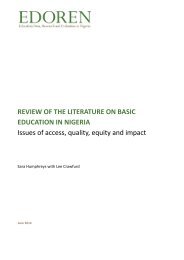review-of-the-literature-on-basic-education-in-nigeria-june-2014-3-1
review-of-the-literature-on-basic-education-in-nigeria-june-2014-3-1
review-of-the-literature-on-basic-education-in-nigeria-june-2014-3-1
You also want an ePaper? Increase the reach of your titles
YUMPU automatically turns print PDFs into web optimized ePapers that Google loves.
Review <str<strong>on</strong>g>of</str<strong>on</strong>g> <str<strong>on</strong>g>the</str<strong>on</strong>g> <str<strong>on</strong>g>literature</str<strong>on</strong>g> <strong>on</strong> <strong>basic</strong> educati<strong>on</strong> <strong>in</strong> NigeriaGaps <strong>in</strong> research: school quality – teacher educati<strong>on</strong> and supervisi<strong>on</strong> to support teach<strong>in</strong>g andlearn<strong>in</strong>g qualityResearch <strong>on</strong> teach<strong>in</strong>g quality also needs complementary research <strong>on</strong> teacher educati<strong>on</strong> (both <strong>in</strong>-serviceand pre-service) and supervisi<strong>on</strong>. This <str<strong>on</strong>g>review</str<strong>on</strong>g> has shown that <str<strong>on</strong>g>the</str<strong>on</strong>g> resp<strong>on</strong>se to poor-quality schoolteach<strong>in</strong>g has <str<strong>on</strong>g>of</str<strong>on</strong>g>ten been to <strong>in</strong>crease <strong>in</strong>-service tra<strong>in</strong><strong>in</strong>g and qualificati<strong>on</strong> upgrad<strong>in</strong>g. On <str<strong>on</strong>g>the</str<strong>on</strong>g> whole,however, <str<strong>on</strong>g>the</str<strong>on</strong>g>re is little available research evidence to suggest that this has helped improve teach<strong>in</strong>gquality, o<str<strong>on</strong>g>the</str<strong>on</strong>g>r than teachers say<strong>in</strong>g that it has. Given that <str<strong>on</strong>g>the</str<strong>on</strong>g>re has also been widespread criticism <str<strong>on</strong>g>of</str<strong>on</strong>g>teacher educati<strong>on</strong>, more detailed research is needed to establish what goes <strong>on</strong> <strong>in</strong> teacher educati<strong>on</strong><strong>in</strong>stituti<strong>on</strong>s and <strong>in</strong> <strong>in</strong>-service tra<strong>in</strong><strong>in</strong>g and school <strong>in</strong>specti<strong>on</strong> and supervisi<strong>on</strong> that helps or h<strong>in</strong>dersimprovements <strong>in</strong> teach<strong>in</strong>g quality.What happens <strong>in</strong> distance teacher educati<strong>on</strong>? How does it compare with face-to-face teachereducati<strong>on</strong>? How do NCE and PGDE preparati<strong>on</strong>s compare? The Grade II teach<strong>in</strong>g qualificati<strong>on</strong> has beensaid by some to have been a better gauge <str<strong>on</strong>g>of</str<strong>on</strong>g> teach<strong>in</strong>g competence than <str<strong>on</strong>g>the</str<strong>on</strong>g> current NCE; if so, whatwere <str<strong>on</strong>g>the</str<strong>on</strong>g> specific features <str<strong>on</strong>g>of</str<strong>on</strong>g> that qualificati<strong>on</strong> that helped prepare teachers better for <str<strong>on</strong>g>the</str<strong>on</strong>g> classroom?What are teachers do<strong>in</strong>g <strong>in</strong> <str<strong>on</strong>g>the</str<strong>on</strong>g> classroom that dem<strong>on</strong>strates <str<strong>on</strong>g>the</str<strong>on</strong>g> effectiveness or not <str<strong>on</strong>g>of</str<strong>on</strong>g> particular types<str<strong>on</strong>g>of</str<strong>on</strong>g> teacher educati<strong>on</strong>?Studies are needed that track tra<strong>in</strong>ee teachers through college, teach<strong>in</strong>g practice, and <str<strong>on</strong>g>the</str<strong>on</strong>g>n <strong>in</strong>to schoolas newly qualified teachers. To what extent are <str<strong>on</strong>g>the</str<strong>on</strong>g> colleges/universities prepar<strong>in</strong>g tra<strong>in</strong>ees for <str<strong>on</strong>g>the</str<strong>on</strong>g>realities <str<strong>on</strong>g>of</str<strong>on</strong>g> <str<strong>on</strong>g>the</str<strong>on</strong>g> classroom and school life? To what extent and <strong>in</strong> what ways do <str<strong>on</strong>g>the</str<strong>on</strong>g>y help studentsacquire subject knowledge? What are <str<strong>on</strong>g>the</str<strong>on</strong>g> students’ learn<strong>in</strong>g experiences and difficulties <strong>in</strong>college/university? How do <str<strong>on</strong>g>the</str<strong>on</strong>g> teacher educati<strong>on</strong> <strong>in</strong>stituti<strong>on</strong>s help students to adapt to schoolsafterwards? What type <str<strong>on</strong>g>of</str<strong>on</strong>g> support is given at each stage by <str<strong>on</strong>g>the</str<strong>on</strong>g> college/university and/or school andhow could it be improved? What k<strong>in</strong>d <str<strong>on</strong>g>of</str<strong>on</strong>g> supervisi<strong>on</strong>/support is given variously by o<str<strong>on</strong>g>the</str<strong>on</strong>g>r school staff,head teachers, local government school supervisors, and o<str<strong>on</strong>g>the</str<strong>on</strong>g>r state or federal school <strong>in</strong>spectors? Howcould it be improved?What k<strong>in</strong>ds <str<strong>on</strong>g>of</str<strong>on</strong>g> ‘good practice’ exist <strong>in</strong> terms <str<strong>on</strong>g>of</str<strong>on</strong>g> good <strong>in</strong>tra-school and <strong>in</strong>ter-school support (e.g. <strong>in</strong>clusters, mentor<strong>in</strong>g programmes, etc.) for teachers by o<str<strong>on</strong>g>the</str<strong>on</strong>g>r teachers or <str<strong>on</strong>g>the</str<strong>on</strong>g> head teacher? Whatfeatures <str<strong>on</strong>g>of</str<strong>on</strong>g> such programmes have a positive effect <strong>on</strong> teach<strong>in</strong>g quality?Research suggests that teachers are unaware <str<strong>on</strong>g>of</str<strong>on</strong>g> and/or unwill<strong>in</strong>g to admit to <str<strong>on</strong>g>the</str<strong>on</strong>g>ir own part, and that <str<strong>on</strong>g>of</str<strong>on</strong>g><str<strong>on</strong>g>the</str<strong>on</strong>g> school more generally, <strong>in</strong> pupil/student failure to learn. Positive reports <strong>on</strong> earlier acti<strong>on</strong>-researchprojects <strong>in</strong> a number <str<strong>on</strong>g>of</str<strong>on</strong>g> states (Adekola 2007) suggest that acti<strong>on</strong> research might be a productivemethodology to encourage teachers (and schools) to reflect more critically <strong>on</strong> <str<strong>on</strong>g>the</str<strong>on</strong>g>ir practices, anddevelop school quality improvement from with<strong>in</strong>.The research evidence <strong>in</strong>dicates low levels <str<strong>on</strong>g>of</str<strong>on</strong>g> teacher pr<str<strong>on</strong>g>of</str<strong>on</strong>g>essi<strong>on</strong>alism <strong>on</strong> <str<strong>on</strong>g>the</str<strong>on</strong>g> part <str<strong>on</strong>g>of</str<strong>on</strong>g> some teachers (e.g.absenteeism, unsancti<strong>on</strong>ed or unregulated corporal punishment, etc.). What are <str<strong>on</strong>g>the</str<strong>on</strong>g> discipl<strong>in</strong>aryprocedures and o<str<strong>on</strong>g>the</str<strong>on</strong>g>r practices that are help<strong>in</strong>g to improve levels <str<strong>on</strong>g>of</str<strong>on</strong>g> teacher pr<str<strong>on</strong>g>of</str<strong>on</strong>g>essi<strong>on</strong>alism? What roleare head teachers, <str<strong>on</strong>g>the</str<strong>on</strong>g> LGEA and/or state <str<strong>on</strong>g>of</str<strong>on</strong>g>ficials play<strong>in</strong>g <strong>in</strong> this? What roles do <str<strong>on</strong>g>the</str<strong>on</strong>g> TRCN, TIP and TDCplay and how do <str<strong>on</strong>g>the</str<strong>on</strong>g>y <strong>in</strong>teract with SUBEBs and LGEAs? How are PTAs, SBMCs and o<str<strong>on</strong>g>the</str<strong>on</strong>g>r communityorganisati<strong>on</strong>s <strong>in</strong>volved <strong>in</strong> improv<strong>in</strong>g teacher pr<str<strong>on</strong>g>of</str<strong>on</strong>g>essi<strong>on</strong>alism? What are <str<strong>on</strong>g>the</str<strong>on</strong>g> c<strong>on</strong>diti<strong>on</strong>s that supporthigher levels <str<strong>on</strong>g>of</str<strong>on</strong>g> teacher pr<str<strong>on</strong>g>of</str<strong>on</strong>g>essi<strong>on</strong>alism?Gaps <strong>in</strong> research: school quality – o<str<strong>on</strong>g>the</str<strong>on</strong>g>r issuesWhat is <str<strong>on</strong>g>the</str<strong>on</strong>g> relati<strong>on</strong>ship between school choice and school quality? Research <strong>in</strong>dicates that parents are<strong>in</strong>creas<strong>in</strong>gly choos<strong>in</strong>g to send <str<strong>on</strong>g>the</str<strong>on</strong>g>ir children to private <strong>in</strong>stituti<strong>on</strong>s, especially <strong>in</strong> urban areas, because<str<strong>on</strong>g>the</str<strong>on</strong>g>se schools are perceived to be better quality. Research is needed to look at how this plays out <strong>in</strong>particular community c<strong>on</strong>texts. Where <str<strong>on</strong>g>the</str<strong>on</strong>g>re are multiple different educati<strong>on</strong> providers available <strong>in</strong> <strong>on</strong>eEDOREN – Educati<strong>on</strong> Data, Research and Evaluati<strong>on</strong> <strong>in</strong> Nigeria 160



